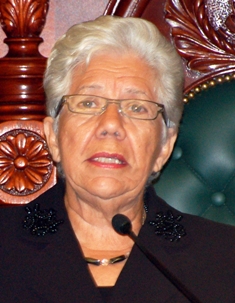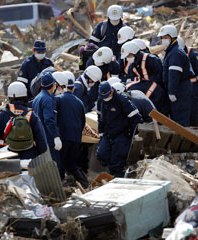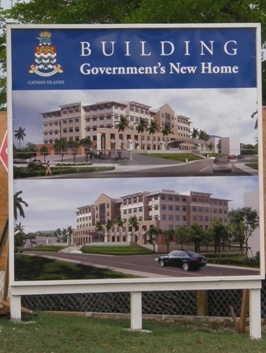Archive for March 14th, 2011

Lawrence: Society has paid for overlooking women
 (CNS): The speaker of the Legislative Assembly has said that the country’s legislators are not prioritising women and family issues, and as a result the country has suffered. In her remarks at the opening of the 4th annual Youth Parliament on Commonwealth Day (Monday 14 March), Mary Lawrence said that women have been missing in the country’s political advancements and “society is paying a high price for that omission”. The speaker said that women and children’s issues were the things that underpinned a stable society but that they were not priorities for the Legislature, which was made up of men. She noted that only nine women had served in the assembly in the 52 years since the country’s first constitution.
(CNS): The speaker of the Legislative Assembly has said that the country’s legislators are not prioritising women and family issues, and as a result the country has suffered. In her remarks at the opening of the 4th annual Youth Parliament on Commonwealth Day (Monday 14 March), Mary Lawrence said that women have been missing in the country’s political advancements and “society is paying a high price for that omission”. The speaker said that women and children’s issues were the things that underpinned a stable society but that they were not priorities for the Legislature, which was made up of men. She noted that only nine women had served in the assembly in the 52 years since the country’s first constitution.
“The political arena is still uncharted territory for women, who consistently continue to vote for men, and then wonder why family and women and children issues — the underpinning of a stable society, and thus a stable economy — are not priority items on the political agenda,” the speaker said.
She pointed to the Children’s Law, which was first passed in 1994 but never enacted. The law returned to the House in 2006 as new legislation but was still not passed, and again in 2009 but has still not been enacted.
“In those 17 years dozens of young people have fallen by the wayside, for which the provisions of that legislation might have proven to be a safety net, and today with all our talk of human rights and freedoms — buzz words in our society — we house our young offenders in the same facility as the crime kings of our society,” Lawrence stated.
Although the speaker said that this didn’t mean that there had not been good, “even brilliant men” in politics in that time or that they didn’t care but she said these were not matters high on their priority list.
While women have made some progress in many areas, she said women should not be afraid to enter the political arena. She noted the theme of Commonwealth Day this year was “Women, Agents ofChange” and that the political arena was a place where women could make lasting change in society.
The speaker noted the irony that in this year’s Commonwealth Day Annual Youth Parliament, while the young women were only slightly less in number than the young men, the leadership roles on both sides of the House were still in the hands of the men.
She said that she hoped the exercise would inspire both genders to learn more of the political and government processes with a view to greater participation as they arrived at the age of voting.
She said the role of a legislator was often negated and derided by society in an age of multi-media — a continual source of what she said was negative headlines.
“I remind you today that there is no higher or more responsible role in our country than that of a legislator, for in the hands of those who fill those positions lie the destiny of a country and its people,” the speaker told the youngsters gathered for the mock parliamentary debate.

Young people being ignored, states teen speaker
 CNS): Local young people are not being given a voice in Cayman society today and are being looked down upon, a teenage temporary speaker said on Monday as she made the opening address for the country’s annual Youth Parliament. Diana Tibbetts, who played the role of speaker during the Commonwealth Parliamentary Association’s event at the Legislative Assembly, said that as everyone was arguing about the need for future changes no one was giving young people a chance to voice their opinions or concerns. The teen also questioned what had happened to the once safe loving Cayman community as she pointed to the surge in violent crime.
CNS): Local young people are not being given a voice in Cayman society today and are being looked down upon, a teenage temporary speaker said on Monday as she made the opening address for the country’s annual Youth Parliament. Diana Tibbetts, who played the role of speaker during the Commonwealth Parliamentary Association’s event at the Legislative Assembly, said that as everyone was arguing about the need for future changes no one was giving young people a chance to voice their opinions or concerns. The teen also questioned what had happened to the once safe loving Cayman community as she pointed to the surge in violent crime.
“We as a country should focus and look at these problems in a mature manner, not bickering and blaming people for this, but coming together as one and trying to fix this,” she said, adding that it was not possible to solve a problem if those involved had problems with each other’s ideas.
She said the changes in the community were greatly affecting those who were still growing up, having a negative impact on young people’s lives.
“We are becoming affected with all these crimes, we are being victims of these crimes,” Tibbetts told the young people representing the country’s youth for the day. “We … want this to stop and we are willing to voice our opinions and facts and statements we know that people are doing and why they are doing it,” she added.
She also noted some of the environmental challenges, including the landfill, which she said most Caymanians know as “Mount Trashmore”, which was a “huge problem that has been ignored” for too long.
“If this situation is not addressed, it will affect the children of the future,” the young speaker noted as she pointed to the smell as well as the visual pollution and the problem of leaching into the North Sound.
“Cayman, the youth wants you to know that we need to all come together and contribute different ideas to find a solution for this growing situation to make Cayman’s environment a safer place for the generations to come,” the youngster said. “Cayman open your eyes, use your ears and listen to us, the youth is crying out for help.”
She asked for the whole country’s support for a better future where people came together to find solutions. “Please listen to what we have to say not only at this youth parliament, but listen to the youth in general, Tibbetts implored. “If you listen to us youth you will hear amazing things that we have to say and the ideas we have for this country of ours as we knowwe all live on this wonderful island and we all want the best for Cayman."
She said that during the day’s debate the country would hear the ideas that the young people had to solve some of the problems the country faced. “Don’t look at us as teenagers all dressed up nicely and just ready to debate against each other. But look at us as Cayman’s future politicians, leaders or great people who want to make a change for Cayman. Listen to our opinions for you may be astonished at what we have to say and how we present this,” the young speaker said.
“We are not just teenagers debating for the fun, but we are concerned citizens of Cayman who want to see a change and the betterment of our beloved isle,” she added, before the debate began.
See full speech below.

ESO reveals BOP deficit rise
 (CNS): The country’s balance of payment deficit has increased, according to the latest statistics from the Economics and Statistics Office (ESO), despite a fall in imports. The overall current account balance of the country was CI$422 million at the end of 2009, the first calculated using a full national survey. The BOP had decreased by $9.3 million over the 2008 figure, which was calculated using secondary data. Although imports fell to $640 million from the previous year’s high of $771million, receipts from services were also down from just over $633 million in 2008 to less than $458 million, leading to the increased deficit.
(CNS): The country’s balance of payment deficit has increased, according to the latest statistics from the Economics and Statistics Office (ESO), despite a fall in imports. The overall current account balance of the country was CI$422 million at the end of 2009, the first calculated using a full national survey. The BOP had decreased by $9.3 million over the 2008 figure, which was calculated using secondary data. Although imports fell to $640 million from the previous year’s high of $771million, receipts from services were also down from just over $633 million in 2008 to less than $458 million, leading to the increased deficit.
As the ESO begins its campaign to encourage local business to take part in the survey for 2010, the office revealed the results from the 2009 BOP, which was based on data collected from the first ever full business survey. The office explained that calculating an accurate BOP is not just an important part of complying with the country’s Public Management and Finance Law but that it is also a key indicator for evaluating the potential and actual macro-economic impact and sustainability of monetary and fiscal policies.
“The overall BOP has a direct bearing on the changes in foreign currency reserve balances of the Cayman Islands currency board system, which is mandated by law to support the fixed exchange rate system currently in effect,” the ESO said in the report.
A negative balance of payments implies a decline in currency reserves, which could undermine the fixed exchange rate, hence the need for banks and governments to produce and monitor BOP statistics as a pro-active instrument for monitoring the sustainability of their exchange rate system. ESO also noted that it was just as important for the private sector, other analysts and regular people to monitor the statistics as unsustainable balances impact on everyone’s well-being.
Cayman’s BOP is made up by examining figures from four areas: firstly, the balance of trade in goods, which was -$640.5 million; secondly, the balance of trade in services, which was $457.9 million; then the balance of income transactions, which was -$57.0 million;and finally the balance of current transfers, which was -$182.5 million.
The ESO said the trade in services, which includes the financial sector and the tourism industry, was the only account in surplus for the country, demonstrating the importance of services to Cayman’s economy.
The ESO pointed out that Cayman’s BOP deficit is not unexpected as the economy is highly dependent on imports for consumption, intermediate goods, fuel and capital goods. However, aside from the significant amounts Caymanians spent on imported goods, the BOP reveals that people here also paid out some $681.9 million on direct investment, which comprised the largest net payments by residents to non-residents, even larger than net payments for merchandise goods.
Money was also flowing out of the country from workers, who sent some $181.1 milllion of their wages overseas, though that was less than in 2009. However, money Caymanians received from people working overseas also fell by $2.5 million to $62.4 million.
Download the Balance of Payments report below or visit the ESO website
Caribbean countries some of best to be a girl
(CNS): A new report published on Monday by the Royal Commonwealth Society and Plan UK, marking the Commonwealth’s 2011 theme ‘Women as Agents of Change’, revealed that Trinidad and Barbados are two of the best countries in the Commonwealth to be born a girl, whilst Sierra Leone and Nigeria are among the worst. The research also shows that girls and women continue to be seriously disadvantaged across the world. The report suggests that it is political will and not economic wealth which is most important in advancing gender equality. Some of the poorest countries in the Commonwealth do relatively well in the report, while some rich countries remain a long way off gender equality.
‘Because You’re a Girl: Growing Up in the Commonwealth’ compares how well girls and women
are doing relative to boys and men in their country across eight indicators. The report uses best available data on indicators that reflect various aspects of a girl’s life cycle, from survival, life expectancy and nutrition to achievement, such as the number of athletes and medals at the
Commonwealth Games, Commonwealth Scholarships won.
New Zealand tops the chart as the best place in the Commonwealth to be born a girl but it is closely followed by two Caribbean countries — Barbados and Trinidad and Tobago. However, at the bottom of the chart, ranking joint 50th are Nigeria and Sierra Leone. India and Pakistan both score poorly, coming in 41st and 45th respectively.
Five times more girls between the ages of 15 and 19 give birth in Nigeria and Sierra Leone than in New Zealand on average, and girls in New Zealand can expect twice the number of years in school than girls in Nigeria.
The United Kingdom ranks joint 8th with Singapore and Rwanda – the Commonwealth’s
newest member state – and comes in at number 10 with the highest female participation in politics in the Commonwealth.
Poverty levels do not always correlate with levels of gender inequality. As Mozambique and Malawi score highly, despite being among some of the poorest countries in the Commonwealth while the Commonwealth’s richest country, Brunei Darussalam, only manages a rank of 23rd.
The report states that the starkest evidence of gender inequality is revealed by the pay gap indicator. Even in the best performing countries, women only earn around four-fifths of male income on average. In New Zealand – the star performer in the final rankings – women only earn around 72 percent of the average income.
Director of the Royal Commonwealth Society, Dr Danny Sriskandarajah said the report makes for worrying reading. “Even the countries at the top of the Commonwealth class fall short of true gender equality,” he said. “I hope Commonwealth leaders will show the political leadership that is needed to promote women as agents of change. This year, the Commonwealth has the opportunity to be at the vanguard of the fight for gender equality.”
Chief Executive of Plan UK, Marie Staunton, said that in the Commonwealth countries that have shown the political will there has been progress in realising girls’ rights, but much more needs to be done. Globally 75 million girls remain out of school and robbed of a fulfilling future. Often undervalued and neglected and held back by their gender and age, girls are prevented from contributing to the societies in which they live. This holds us all back. Plan’s ‘Because I am a Girl’ campaign challenges each of us to take practical action towards a Commonwealth and a world in which every girl can fulfil their potential,” she added.
See Queen’s speech for Commonwealth Day below

Cayman retains global 2nd place in captive rankings
 (CNS): At the end of 2010 the Cayman Islands was home to 738 of the world’s 5,627 insurance captives, according to the industry magazine, Business Insurance. In its captive insurance report, the publication ranked Cayman second behind Bermuda, where 845 captives were domiciled at the end of 2010. Behind the Cayman Islands is the American state of Vermont, which has 572, and in fourth is Guernsey with 34, and rounding out the top five is Anguilla with 252. The magazine also stated that the world’s largest captive managers were Marsh Captive Solutions (1,263), Aon Global Insurance Managers (1,218), Willis Management (318), USA Risk Group (197), and HSBC Insurance Management (196).
(CNS): At the end of 2010 the Cayman Islands was home to 738 of the world’s 5,627 insurance captives, according to the industry magazine, Business Insurance. In its captive insurance report, the publication ranked Cayman second behind Bermuda, where 845 captives were domiciled at the end of 2010. Behind the Cayman Islands is the American state of Vermont, which has 572, and in fourth is Guernsey with 34, and rounding out the top five is Anguilla with 252. The magazine also stated that the world’s largest captive managers were Marsh Captive Solutions (1,263), Aon Global Insurance Managers (1,218), Willis Management (318), USA Risk Group (197), and HSBC Insurance Management (196).
This year Business Insurance also sought to identify the number of captives electing to operate under Internal Revenue Code Section 831(b), which allows captives that collect less than $1.2 million in premiums a year to elect to pay federal taxes only on their investment income. Managers reported a total of 703 831(b) captives, with the largest such managers including Artex Risk Solutions Inc. (145), Active Captive Management LLC (141), and Alta Holdings LLC (93).
Meanwhile, according to reports on Bloomberg, insurance companies are looking at billions in losses from the earthquake in Japan, with one early estimate placing the figure as high as $35 billion US. oAIR Worldwide, a Boston-based specialist in catastrophe modelling, said on Sunday that insured losses will likely come in a range between $15 billion to $35 billion. That estimate only covers damage from the initial 8.9 earthquake, however, and not the tsunami or multiple aftershocks that followed.
"Despite a probably low insurance penetration, we feel that the magnitude of this event might make it the largest insured event ever," DZ Bank analyst Thorsten Wenzel told Bloomberg.
East End hotel site might benefit from Shetty hospital
(CNS): The site that was originally planned to be the location for a proposed Mandarin Oriental resort in East End is on the market for $18million and the real estate agent says it could be close to the Shetty hospital. JC Calhoun of Coldwell Banker says that the beach front plot, which is over nineteen acres in total, along the Queens Highway is a bank forced sale. “This land will likely not be far from the new 2,000 bed medical complex. It is a prime property normally not available,” Calhoun writes on the real estate website.
It was almost six years ago that the international hotel brand announced that it would be managing an exclusive hideaway resort designed for sophisticated travellers in search of “tranquillity, serenity and luxury”, with 114 “lavish guest rooms and suites” on the unspoiled site known as Barefoot Beach. The resort was planned to be developed by a company called Barefoot Resorts, Ltd, which was described at the time as a private investment company formed by G. Stuart Wood and Jeffrey J. Cotter, based in Naples, Florida, and Naul Bodden of Grand Cayman.
Calhoun, who is now selling the prime plot, told CNS that he did not know the location of the hospital, but based on the desires of the group he believed it would be close to this hotel site, making it an even more attractive proposition.
Gene Thompson, who has been working with Dr Devi Shetty to help get the proposed hospital project off the ground, also confirmed to CNS that a site has not yet been chosen, despite wide speculation that it may be in East End. Thompson noted it wasn’t the first time that those in the real estate business had used the proposed hospital and the speculation about the site to help boost sales but he said no one knew where the hospital would be because it still had not been settled. He did, however, say it wouldn’t be long before a decision would be made and announcements about the next steps in the project revealed.
The legislation that Dr Shetty said was required in order to make the development of the health city in Cayman feasible is in the process of being created. The changes to the health practitioner’s bill were passed in the last session of the Legislative Assembly and government will be brining a new piece of legislation to deal with the cap on medical compensation claims when the LA resumes on Wednesday.
In the case of the last change that Shetty requires to facilitate organ and tissue transplant and donation, a committee was recently established under the chairmanship of backbench UDP MLA Elio Solomon to examine what type of legislation would be required and to begin drafting that law.

Japanese earthquake shakes markets
 (Reuters): Japanese stocks suffered their biggest slide since the 2008 financial crisis Monday, with investors eyeing a further drop as the uncertainty over the country’s nuclear crisis compounds worries that the quake and tsunami will cause deeper economic pain than initially thought. The TOPIX tumbled 7.5 percent on record trading volume as investors bailed out of big blue-chip companies seen taking a hit from the need for rolling electricity blackouts on top of the disruptions to supply chains following the massive quake. With Monday’s selloff, the market capitalisation of shares on the Tokyo stock exchange’s first section fell by roughly $286 billion — greater than the size of Finland’s economy.
(Reuters): Japanese stocks suffered their biggest slide since the 2008 financial crisis Monday, with investors eyeing a further drop as the uncertainty over the country’s nuclear crisis compounds worries that the quake and tsunami will cause deeper economic pain than initially thought. The TOPIX tumbled 7.5 percent on record trading volume as investors bailed out of big blue-chip companies seen taking a hit from the need for rolling electricity blackouts on top of the disruptions to supply chains following the massive quake. With Monday’s selloff, the market capitalisation of shares on the Tokyo stock exchange’s first section fell by roughly $286 billion — greater than the size of Finland’s economy.
Analysts said the risk was for a further drop in shares as investors come to terms with the fast-rising economic toll from Japan’s worst crisis since World War Two.
United World Colleges receives $45,000 for grants
(CNS): Alumni and friends of the United World Colleges (Cayman Islands) National Foundation (CIUWC) have helped establish the Dr Pedley Memorial Award as part of the CIUWC Scholarship Fund to provide financial support for outstanding Caymanian students accepted to the United World Colleges programme. Dr Philip Pedley, who passed away in May 2010, had previously served as chairperson of the CIUWC Board in addition to his numerous other contributions to the local community.
The idea for a fund in Dr Pedley’s name came from local attorney and past board director Colin Shaw, whose offer to provide half of the initial funds for it was matched by UWC alumni Linburgh Martin and together they pledged approximately US$22,000 over the course of two years. Martin was one of the first students CIUWC accepted to the UWC programme.
The contributions in memory of Dr Pedley were given a further boost by a pledge of US$20,000 for the 2011-2012 academic year from the Aall Foundation, a charitable trust formed in Cayman in 1982.
Donations by other alumni and friends of CIUWC have resulted in a total of over US$45,000 pledged to the Dr Pedley Memorial Award and CIUWC Scholarship Fund. The funding will expand the number of full scholarships available to Caymanian UWC students, with a portion set aside for the creation of the Dr Pedley Memorial Award. This award will be given to Caymanian graduates of UWC who meet superior academic and local community service requirements, as well as upholding outstanding behavioural and social choices throughout their attendance at UWC whilst representing the Cayman Islands. A US$1,000 stipend will be presented to recipients of the award to assist with their future educational expenses.
Dr Pedley’s widow, Arthurlyn Pedley, said, “I’m deeply touched by the generous outpouring of support for UWC given in memory of Philip by his former colleagues Colin Shaw, Linburgh Martin, the Aall Foundation, as well as by friends in the wider community as a whole. I know that he would be humbled by the fact that his passing has resulted in strengthening the financial support for this very worthy organisation whose ideals he supported.”
Orchid Morrison, current Chairperson for CIUWC, stated, “Words cannot express how grateful we are to the Aall Foundation, Linburgh Martin and Colin Shaw for their most generous contributions. We are also thankful to Mrs. Arthurlyn Pedley and all the CIUWC alumni (Aubrey Bodden, Daniel Stuber and Lisa Hurlstone, among others) who also gave donations to the CIUWC Foundation. Thank you so very much for your continued support.”
The United World Colleges were conceived in the 1950’s by the notable educationalist Kurt Hahn, who is also the founder of the Duke of Edinburgh Award programme. UWC offers an exceptional learning and living experience for students from over 120 countries. Founded on the ideals of international peace and understanding, the United World Colleges are a university preparation programme for students aged 15–18 years old that awards the International Baccalaureate Diploma on successful completion. The programme is based upon participation in a two-year, academically rigorous set of courses coupled with community service, cultural endeavours and physical activities.
The United World Colleges (Cayman Islands) National Foundation is in its 27th year of operation. Caymanian UWC students join a network of nearly 40,000 other UWC students and alumni across the globe.
Companies and individuals interested in making a donation to CIUWC in Dr Pedley’s memory are invited to contactOrchid Morrison at CIUWCFoundation@yahoo.com or 345–814–2734.

CIMA stays put as civil servants move to new office
 (CNS): Following recent announcements that the Cayman Islands Monetary Authority will not be moving into the government’s new office accommodation building, as was originally planned, in order to preserve the authority’s autonomy from government, the managing director said last week that it won’t be moving elsewhere. Cindy Scotland told CNS via e-mail that CIMA has no plans to move to a different location and that it will be staying in its current offices. Although offices on the third floor in the new government building on Elgin Avenue had been earmarked for CIMA’s more than 200 workers and especially fitted for the regulator, the authority made representations to government that the need to demonstrate its independence would mean it should not move there.
(CNS): Following recent announcements that the Cayman Islands Monetary Authority will not be moving into the government’s new office accommodation building, as was originally planned, in order to preserve the authority’s autonomy from government, the managing director said last week that it won’t be moving elsewhere. Cindy Scotland told CNS via e-mail that CIMA has no plans to move to a different location and that it will be staying in its current offices. Although offices on the third floor in the new government building on Elgin Avenue had been earmarked for CIMA’s more than 200 workers and especially fitted for the regulator, the authority made representations to government that the need to demonstrate its independence would mean it should not move there.
The authority has stated that it “will eventually have to move”, although it will be remaining at its current Elizabethan Square location for the time being. “At this time, the Authority has not made plans for another arrangement at a different location,” Scotland told CNS by email.
The move by the bulk of civil servants from the Glass House and other rented accommodation around George Town into the new government office accommodation has been delayed a number of times, despite the fact that the building has been completed for some time, and the move was scheduled for January.
Officials recently stated that government workers should be in the new building by the end of March. It will be home to 29 different government departments, including the Governor’s Office, which is currently in the building on Smith Road, and the Premier’s Office, which is presently in the Glass House.
The new building, which has LEED certification and is being described as a “green building” as a result of the design being energy efficient, cost around $85 million to build but it is expected to save government more than $10 milllion per year in rental costs.

Local expert reveals etiquette of business
 (CNS): Local business students have been given insight into what one executive says is an area often overlooked in courses covering business studies. Associate Director Amber Ramsey from the dms Organization Ltd. recently shared the benefit of her experience on business etiquette with students at International College of the Cayman Islands (ICCI) during one of a series of specialist lectures being undertaken by dms staff. Etiquette prepares students for different scenarios from social events to doing business overseas as well as the right way to present business emails and even how to present business cards, the expert stated.
(CNS): Local business students have been given insight into what one executive says is an area often overlooked in courses covering business studies. Associate Director Amber Ramsey from the dms Organization Ltd. recently shared the benefit of her experience on business etiquette with students at International College of the Cayman Islands (ICCI) during one of a series of specialist lectures being undertaken by dms staff. Etiquette prepares students for different scenarios from social events to doing business overseas as well as the right way to present business emails and even how to present business cards, the expert stated.
“Business etiquette plays a subtle yet important role in professional life that might be overlooked by recent college graduates,” Ramsey said. “It is one of those subjects that could have multiple lectures dedicated to different topics from email etiquette to international etiquette when working in foreign countries and cultures.”
The business etiquette class aims to help students prepare for different business settings, Ramsey explained in a release from dms. At Social events people are out of their office comfort zone and it is particularly useful in heightening awareness about how to approach people in business settings from different countries, which she said was important in a country like the Cayman Islands with so many nationalities conducting business here.
Samone Morgan, an International College student, said, “What stood out to me was learning how people from different countries and cultures present business cards, particularly in Japan where it is considered something special. I also enjoyed hearing about the different ways people shake hands- just basic things that are often overlooked.”
Richard Harrison, Vice President of Finance was also sharing his knowledge with students at ICCC on the subject of expanding businesses on an international level. Having recently spent time in the dms offices in Hong Kong and Brazil he revealed some of the challenges.
International College’s Chief Academic Officer Scott Cummings explained that dms guest lecturer series was an important element in the courses offered by the college as students gained hands-on knowledge about current issues and business strategies, in fields like finance, management and accounting “It allows our students to hear about the very latest trends in their fields of study," he added.